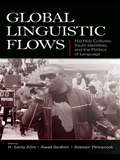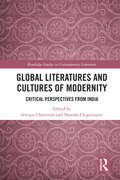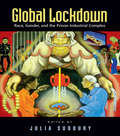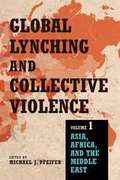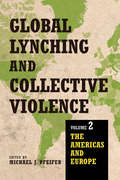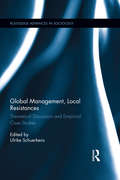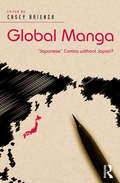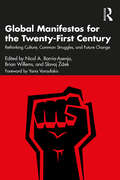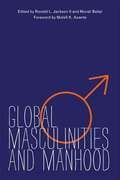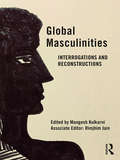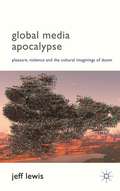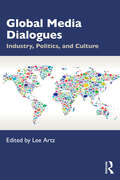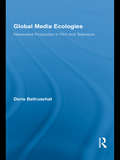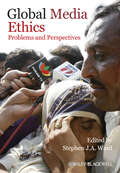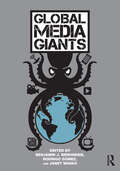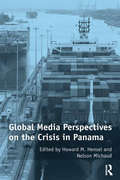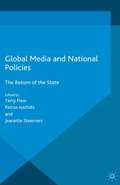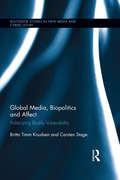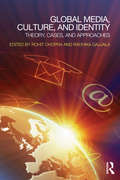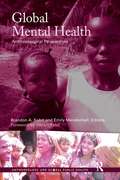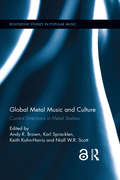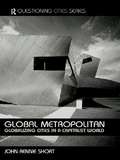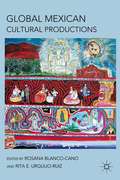- Table View
- List View
Global Linguistic Flows: Hip Hop Cultures, Youth Identities, and the Politics of Language
by Alastair Pennycook Awad Ibrahim H. Samy AlimLocated at the intersection of sociolinguistics and Hip Hop Studies, this cutting-edge book moves around the world – spanning Africa, Asia, Australia, the Americas and the European Union – to explore Hip Hop cultures, youth identities, the politics of language, and the simultaneous processes of globalization and localization. Focusing closely on language, these scholars of sociolinguistics, linguistic anthropology, cultural studies, and critical pedagogies offer linguistic insights to the growing scholarship on Hip Hop Culture, while reorienting their respective fields by paying closer attention to processes of globalization and localization. The book engages complex processes such as transnationalism, (im)migration, cultural flow, and diaspora in an effort to expand current theoretical approaches to language choice and agency, speech style and stylization, codeswitching and language mixing, crossing and sociolinguistic variation, and language use and globalization. Moving throughout the Global Hip Hop Nation, through scenes as diverse as Hong Kong’s urban center, Germany’s Mannheim inner-city district of Weststadt, the Brazilian favelas, the streets of Lagos and Dar es Salaam, and the hoods of the San Francisco Bay Area, this global intellectual cipha breaks new ground in the ethnographic study of language and popular culture.
Global Literatures and Cultures of Modernity: Critical Perspectives from India (Routledge Studies in Contemporary Literature)
by Srirupa Chatterjee Sharada ChigurupatiGlobal Literatures and Cultures of Modernity: Critical Perspectives from India brings together essays written by academicians and scholars from India to scrutinize how global modernities have been shaped since World War II, from the Indian perspective.It examines the literary musings of Anglophone writers hailing from various parts of the globe whose diverse voices present compelling narratives on modernity vis-à-vis the human condition. This volume brings together critical essays on writers such as Girish Karnad, Anita Desai, Anita Nair, and Jean Arasanayagam to examine the South Asian experience; by Chimamanda Ngozi Adichie and Naguib Mahfouz to explore the African and Arabic world order; by Jane Harrison and Wesley Enoch to address the Australian aboriginal condition; by William Golding, Kazuo Ishiguro, and Sarah Kane to scrutinize British cultural politics; by Jamaica Kincaid and Elizabeth Acevedo to highlight Latin American and Caribbean modernity, and last but not the least, by John Updike, Cormac McCarthy, and Mary Gordon to analyze North American politico-religious experiences of modernity. The diverse themes in this book therefore touch upon historical trauma, religious revisioning, masculinity, feminist debates, gender studies, ethnic discrimination and diversity, and caste and class politics, among many others.The book’s varied themes are united by the fact that they all converse with global and transnational dynamics shaped by post-war modernity that define our world today. The book crafts narratives on contemporary global literatures and the modern conditions they represent and does so from the vantage point of postmillennial Indian literary scholarship.
Global Lockdown: Race, Gender, and the Prison-Industrial Complex
by Julia SudburyGlobal Lockdown is the first book to apply a transnational feminist framework to the study of criminalization and imprisonment. The distinguished contributors to this collection offer a variety of perspectives, from former prisoners to advocates to scholars from around the world. The book is a must-read for anyone concerned by mass incarceration and the growth of the prison-industrial complex within and beyond U.S. borders, as well as those interested in globalization and resistance.
Global Lynching and Collective Violence: Asia, Africa, and the Middle East
by Michael J. PfeiferOften considered peculiarly American, lynching in fact takes place around the world. In the first book of a two-volume study, Michael J. Pfeifer collects essays that look at lynching and related forms of collective violence in Africa, Asia, and the Middle East. Understanding lynching as a transnational phenomenon rooted in political and cultural flux, the writers probe important issues from Indonesia--where a long history of public violence now twines with the Internet--to South Africa, with its notorious history of necklacing. Other scholars examine lynching in medieval Nepal, the epidemic of summary executions in late Qing-era China, the merging of state-sponsored and local collective violence during the Nanking Massacre, and the ways public anger and lynching in India relate to identity, autonomy, and territory. Contributors: Laurens Bakker, Shaiel Ben-Ephraim, Nandana Dutta, Weiting Guo, Or Honig, Frank Jacob, Michael J. Pfeifer, Yogesh Raj, and Nicholas Rush Smith.
Global Lynching and Collective Violence: The Americas and Europe
by Michael J. PfeiferIn this second volume of the groundbreaking survey, Michael J. Pfeifer edits a collection of essays that illuminates lynching and other extrajudicial "rough justice" as a transnational phenomenon responding to cultural and legal issues. The volume's European-themed topics explore why three communities of medieval people turned to mob violence, and the ways exclusion from formal institutions fueled peasant rough justice in Russia. Essays on Latin America examine how lynching in the United States influenced Brazilian debates on race and informal justice, and how shifts in religious and political power drove lynching in twentieth century Mexico. Finally, scholars delve into English Canadians' use of racist and mob violence to craft identity; the Communist Party's Depression-era campaign against lynching in the United States; and the transnational links that helped form--and later emanated from--Wisconsin's notoriously violent skinhead movement in the late twentieth century. Contributors: Brent M. S. Campney, Amy Chazkel, Stephen P. Frank, Dean J. Kotlowski, Michael J. Pfeifer, Gema SantamarÃa, Ryan Shaffer, and Hannah Skoda.
Global Management, Local Resistances: Theoretical Discussion and Empirical Case Studies (Routledge Advances in Sociology)
by Ulrike SchuerkensThis book originates from a research project involving extensive collection and analysis of primary and secondary materials (scholarly literature, statistical data, and interviews with key actors) on global management and local resistances in all major world regions during the last years. It seeks to assess the overall management situation in the world, looking at the world as a social system where some countries act as winners of socioeconomic globalization, others as losers, and some as both. Offering analytical and comparative insights at the global level, this book will be useful for scholars, students, NGOs, and policy makers.
Global Manga: 'Japanese' Comics without Japan?
by Casey BrienzaOutside Japan, the term ’manga’ usually refers to comics originally published in Japan. Yet nowadays many publications labelled ’manga’ are not translations of Japanese works but rather have been wholly conceived and created elsewhere. These comics, although often derided and dismissed as ’fake manga’, represent an important but understudied global cultural phenomenon which, controversially, may even point to a future of ’Japanese’ comics without Japan. This book takes seriously the political economy and cultural production of this so-called ’global manga’ produced throughout the Americas, Europe, and Asia and explores the conditions under which it arises and flourishes; what counts as ’manga’ and who gets to decide; the implications of global manga for contemporary economies of cultural and creative labour; the ways in which it is shaped by or mixes with local cultural forms and contexts; and, ultimately, what it means for manga to be ’authentically’ Japanese in the first place. Presenting new empirical research on the production of global manga culture from scholars across the humanities and social sciences, as well as first person pieces and historical overviews written by global manga artists and industry insiders, Global Manga will appeal to scholars of cultural and media studies, Japanese studies, and popular and visual culture.
Global Manifestos for the Twenty-First Century: Rethinking Culture, Common Struggles, and Future Change
by Slavoj Žižek Brian Willems Nicol A. Barria-AsenjoBringing together over forty original short essays, some academic, others more creative in nature, this collection responds to the political, historical, social, and economic situation in which we find ourselves today. The editors argue that we are living in a repetition that must be stopped – if our goal is that the signifier "humanity" remains in the following centuries, the time has come to work in the present. The objective is not to deliver precise or quick answers, but to gather varied voices from different continents, bringing together different languages, ideas, practices, theories, thoughts, and desires. In the words of Yanis Varoufakis, "urging us to become agents of a future that ends unnecessary mass suffering and inspire humanity to realise its potential for authentic freedom." To leave the concept of a manifesto open, the contradictory aspects of the chapters are a subject of the manifesto itself. This is a manifesto of contradictions that reflects our reality as well as our struggles and our aspirations. This unique anthology will appeal to students and scholars across the humanities and social sciences interested in critical theory and social change.
Global Masculinities and Manhood
by Murali Balaji Ronald L Jackson Molefi AsanteBringing together an array of interdisciplinary voices, Global Masculinities and Manhood examines the concept of masculinity from the perspectives of cultures around the world. Contributors to this volume deconstruct the history and politics of masculinities within the contexts of the cultures from which they have been developed, examining what makes a man who he is within his own culture. Highlighting manifestations of masculinity in countries including Jamaica, Turkey, Peru, Kenya, Australia, and China, scholars from a variety of disciplines grapple with topics including how masculinity is affected by war and conflict, defined in relation to race, ethnicity, and sexuality, and expressed in cultural activities such as sports or the cinema. Contributors are Bryant Keith Alexander, Molefi K. Asante, Murali Balaji, Maurice Hall, Ronald L. Jackson II, Shino Konishi, Nil Mutluer, Mich Nyawalo, Kathleen Glenister Roberts, Margarita Saona, and Kath Woodward.
Global Masculinities: Interrogations and Reconstructions
by Mangesh Kulkarni Rimjhim JainWhat does it mean to be male in today’s world? This volume interrogates the myriad practices and myth-making that underlie dominant and subordinate constructions of masculinities around the world. Challenging the patriarchal bias that restricts alternative understanding of masculinities, this volume documents and shares evidence, insights and direction on how men and boys can creatively contribute to gender equality in the twenty-first century. The book: highlights the many lives of men and their interactions with socioeconomic and political processes, including the family, fatherhood, migration, development and violence; critiques hegemonic masculinities, and grapples with effective practices that engage men in the empowerment of women; explores how cultures of masculinity can be transformed to promote social justice, conflict-resolution and peace-building within and across nations The book will be indispensable to researchers interested in critical masculinity studies, women’s studies, sociology, social anthropology, law, public policy, political science and international relations. It will also be of great relevance to government officials, NGO activists, and other practitioners concerned with gender, health and development issues.
Global Media Apocalypse
by Jeff LewisThe modern world seems trapped between fantasies of infinite pleasure and the prospects of total global catastrophe. Global Media Apocalypse explores these contrary imaginings through an evolving cultural ecology of violence. Articulated through the global media, these apocalyptic fantasies express a profoundly human condition of crisis.
Global Media Dialogues: Industry, Politics, and Culture
by Lee ArtzThis book, the first of its kind, brings together leading scholars from multiple perspectives in a serious dialogue about continuity and change in global media production and content. Looking at a wide swath of the world, these authors show the emergence of transnational collaboration in global television and film production across national borders that seem to transcend national cultures and identities. At the same time, traditional class analysis of such phenomena is reframed within the rise of myriad social movements for equality, democracy, human rights, and defense of the environment. What are the effects of media, local or global? Does the West continue to dominate or is cultural imperialism waning? With original chapters written by leading scholars from a variety of disciplines, this book will appeal to students and scholars interested in global media communication, cultural studies, and international political economy.
Global Media Dialogues: Industry, Politics, and Culture
by Lee ArtzThis book, the first of its kind, brings together leading scholars from multiple perspectives in a serious dialogue about continuity and change in global media production and content. Looking at a wide swath of the world, these authors show the emergence of transnational collaboration in global television and film production across national borders that seem to transcend national cultures and identities. At the same time, traditional class analysis of such phenomena is reframed within the rise of myriad social movements for equality, democracy, human rights, and defense of the environment. What are the effects of media, local or global? Does the West continue to dominate or is cultural imperialism waning? With original chapters written by leading scholars from a variety of disciplines, this book will appeal to students and scholars interested in global media communication, cultural studies, and international political economy.
Global Media Ecologies: Networked Production in Film and Television (Routledge Advances In Internationalizing Media Studies #6)
by Doris BaltruschatIn this study, Baltruschat calls attention to dramatic changes in worldwide media production. Her work provides new insights into industry re-organization, digital media, and audience interactivity as pivotal relationships are redrawn along the entire value chain of production, distribution, and consumption. Based on an international study, she details how cultural agents now negotiate a media landscape through collaborative ventures, co-productions and format franchising. These varied collaborations define the new global media economy and affect a shift across the entire field of cultural production. Through detailing the intricacies of globally networked production ecologies, Baltruschat elucidates the shifting power relations in media production, especially in regards to creative labor and trade of intellectual properties. In the new global economy, "content" has become the "new currency." As a result, relational dynamics between cultural agents emerge as key forces in shaping worldwide cultural production, now increasingly characterized by flexible production and consumption. The blurring of lines in international media developments require new parameters, which define creativity and intellectual property in relation to interactive audiences and collaboratively produced content. Baltruschat clearly maps and defines these new dynamics and provides solutions as to how creative labor constellations can advance and enrich the new media economy. This is especially pertinent as global film and TV production does not necessarily result in greater media diversity. On the contrary, interdependencies in policy regimes, prioritization of certain genres, and branded entertainment epitomize how current networked ecologies reflect broader trends in cultural and economic globalization.
Global Media Ethics
by Stephen J. WardGlobal Media Ethics is the first comprehensive cross-cultural exploration of the conceptual and practical issues facing media ethics in a global world. A team of leading journalism experts investigate the impact of major global trends on responsible journalism.The first full-length, truly global textbook on media ethics Explores how current global changes in media promote and inhibit responsible journalismIncludes relevant and timely ethical discussions based on major trends in journalism and global mediaQuestions existing frameworks in Media Ethics in light of the impact of global mediaContributors are leading experts in global journalism and communication
Global Media Giants
by Janet Wasko Benjamin Birkinbine Rodrigo GomezGlobal Media Giants takes an in-depth look at how media corporate power works globally, regionally, and nationally, investigating the ways in which the largest and most powerful media corporations in the world wield power. Case studies examine not only some of the largest media corporations (News Corp., The Microsoft Corporation) in terms of revenues, but also media corporations that hold considerable power within national, regional, or geolinguistic contexts (Televisa, The Bertelsmann Group, Sony Corporation). Each chapter approaches a different corporation through the lens of economy, politics, and culture, giving students and scholars a thoughtful and data-driven guide with which to interrogate contemporary media industry power.
Global Media Perspectives on the Crisis in Panama
by Nelson MichaudOperation Just Cause, the United States' incursion into Panama, was the culmination of a gradually escalating confrontation between the United States and the Noriega dominated government of Panama that extended from June, 1987 until early January, 1990. Applying diverse methodological approaches, this volume examines the various ways representative examples of the global media covered the developing crisis and the eventual US incursion into Panama. The volume: - sets the stage for this analysis by delineating the chronological development of the escalating confrontation, as well as by examining the confrontation from the perspective of the US government - analyzes the crisis from the perspective of the US, Soviet, Canadian, French, Portuguese, Arab, and the People's Republic of China media - exposes the challenges for public affairs officers operating within the context of the global media response to international crises, and provides an assessment of the implications of the crisis for inter-American and international relations. This analysis and evaluation of a variety of global media perspectives on the escalating US-Panamanian confrontation will serve to better illuminate and further enrich our understanding of a major international event - indeed, one of the final events of the Cold War era.
Global Media Studies: An Ethnographic Perspective
by Marwan M. Kraidy Patrick D. MurphyGlobal Media Studies explores the theoretical and methodological threats that are defining global media studies as a discipline. Emphasizing the connection of globalisation to local culture, this collection considers the diversity of modes of reception, reception contexts, uses of media content, and the performative and creative relationships that audiences develop with and through the media. Through ethnographic case studies from Brazil, Denmark, the UK, Japan, Lebanon, Mexico, South Africa, Turkey and the United States, the contributors address such questions as: what links media consumption to a lived global culture; what role cultural tradition plays globally in confronting transnational power; how global elements of mediated messages acquire class; and regional and local characteristics.
Global Media and National Policies: The Return of the State (Palgrave Global Media Policy and Business)
by Terry Flew Petros Iosifidis Jeanette SteemersConventional wisdom views globalization as a process that heralds the diminishing role or even 'death' of the state and the rise of transnational media and transnational consumption. Global Media and National Policies questions those assumptions and shows not only that the nation-state never left but that it is still a force to be reckoned with. With contributions that look at global developments and developments in specific parts of the world, it demonstrates how nation-states have adapted to globalization and how they still retain key policy instruments to achieve many of their policy objectives. This book argues that the phenomenon of media globalization has been overstated, and that national governments remain key players in shaping the media environment, with media corporations responding to the legal and policy frameworks they deal with at a national level.
Global Media, Biopolitics, and Affect: Politicizing Bodily Vulnerability (Routledge Studies in New Media and Cyberculture)
by Britta Timm Knudsen Carsten StageGlobal Media, Biopolitics and Affect shows how mediations of bodily vulnerability have become a strong political force in contemporary societies. In discussions and struggles concerning war involvement, healthcare issues, charity, democracy movements, contested national pasts, and climate change, performances of bodily vulnerability is increasingly used by citizens to raise awareness, create sympathy, encourage political action, and to circulate information in global media networks. The book thus argues that bodily vulnerability can serve as a catalyst for affectively charging and disseminating particular political events or issues by means of media. To investigate how, when and why that happens, and to evaluate the long-term social impacts of mediating bodily vulnerability, the book offers a theoretical framework for understanding the role of bodily vulnerability in contemporary digital media culture. Likewise, it presents a range of close empirical case studies in the areas of illness blogging, global protests after the killing of Neda Agda Soltan in Iran, charity communication, green media activism, online war commemoration and digital witnessing related to conflicts in Sarajevo and Ukraine.
Global Media, Culture, and Identity: Theory, Cases, and Approaches
by Radhika Gajjala Rohit ChopraThis edited volume examines the ways that global media shapes relations between place, culture, and identity. Through the included essays, Chopra and Gajjala offer a mix of theoretical reflections and empirical case studies that will help readers understand how the media can shape cultural identities and, conversely, how cultural formations can influence the political economy of global media. The interdisciplinary, international scholars gathered here push the discussion of what it means to do global media studies beyond uncritical celebrations of the global media technologies (or globalization) as well as beyond perspectives that are a priori dismissive of the possibilities of global media. Some of the key questions and themes that the international contributors explore within the text include: Is the global audience of global television the same as the global audience of the internet? Can we conceptualize the global culture-media-identity dynamic beyond the discourse of postcolonialism? How does the globalization of media affect feelings of nationalism? How is the growth of a consumer "global middle class" spread, and resisted, through media? Global Media, Identity, and Culture takes a comparative media approach to addressing these, and other, issues across media forms including print, television, film, and new media
Global Mental Health: Anthropological Perspectives (Anthropology and Global Public Health #2)
by Emily Mendenhall Brandon A. KohrtWhile there is increasing political interest in research and policy-making for global mental health, there remain major gaps in the education of students in health fields for understanding the complexities of diverse mental health conditions. Drawing on the experience of many well-known experts in this area, this book uses engaging narratives to illustrate that mental illnesses are not only problems experienced by individuals but must also be understood and treated at the social and cultural levels. The book -includes discussion of traditional versus biomedical beliefs about mental illness, the role of culture in mental illness, intersections between religion and mental health, intersections of mind and body, and access to health care; -is ideal for courses on global mental health in psychology, public health, and anthropology departments and other health-related programs.
Global Metal Music and Culture: Current Directions in Metal Studies (Routledge Studies in Popular Music)
by Keith Kahn-Harris Karl Spracklen Niall Scott Andy R. BrownThis book defines the key ideas, scholarly debates, and research activities that have contributed to the formation of the international and interdisciplinary field of Metal Studies. Drawing on insights from a wide range of disciplines including popular music, cultural studies, sociology, anthropology, philosophy, and ethics, this volume offers new and innovative research on metal musicology, global/local scenes studies, fandom, gender and metal identity, metal media, and commerce. Offering a wide-ranging focus on bands, scenes, periods, and sounds, contributors explore topics such as the riff-based song writing of classic heavy metal bands and their modern equivalents, and the musical-aesthetics of Grindcore, Doom metal, Death metal, and Progressive metal. They interrogate production technologies, sound engineering, album artwork and band promotion, logos and merchandising, t-shirt and jewellery design, and fan communities that define the global metal music economy and subcultural scene. The volume explores how the new academic discipline of metal studies was formed, also looking forward to the future of metal music and its relationship to metal scholarship and fandom. With an international range of contributors, this volume will appeal to scholars of popular music, cultural studies, and sociology, as well as those interested in metal communities around the world.
Global Metropolitan: Globalizing Cities in a Capitalist World (Questioning Cities)
by John Rennie-ShortExploring the connections between globalization and urbanization, this notable book places particular emphasis on understanding the economic function of global cities, the political process of globalizing cities, and the cultural significance of cosmopolitan cities. The book explores the meaning of the globalizing project in cities: the maintaining, securing and increasing of urban economic competitiveness in a global world the reimagining of the city the rewriting of the city for both internal and external audiences the construction of new spaces and the hosting of new events. Specific chapters look at the significance of signature architects, the hosting of the Summer Olympics and the role of the super-rich. The main thesis of the book is that this discourse of globalizing is a major force in the restructuring of cities around the world.
Global Mexican Cultural Productions
by Rita E. Urquijo-Ruiz Rosana Blanco-CanoIn this book, the authors propose a multilayered reading of contemporary transnational cultural manifestations in which it is possible to recognize challenges and cultural strategies that transnational Mexican communities conceive in order to claim cultural, political and social agency.
